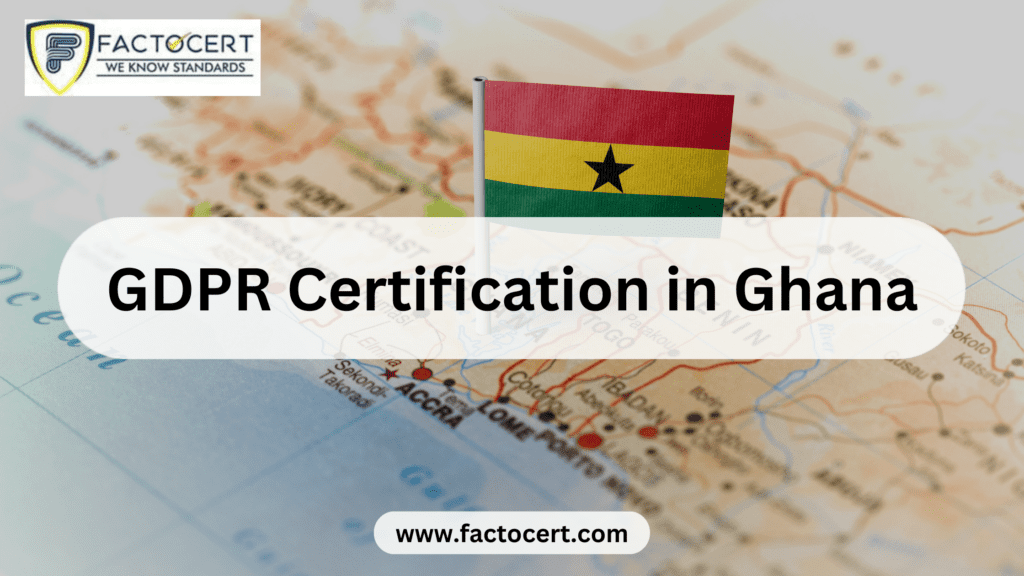GDPR Certification and data protection compliance in Ghana are two critical issues that have gained significance in this respect. In this blog article, we’ll look at what GDPR Certification comprises and the importance of data protection compliance in Ghana.
Understanding GDPR Certification
The General Data Protection Regulation (GDPR) is a comprehensive legislative framework adopted by the European Union (EU) to safeguard individuals’ privacy and data rights. GDPR establishes strict limits for collecting, processing, and storing personal data, primarily providing individuals more control over their data.
GDPR Certification is not a legal necessity but rather a voluntary step by enterprises to demonstrate their commitment to data protection and GDPR compliance. GDPR Certification requires a recognised Certification authority to completely examine an organisation’s data processing operations, policies, and security measures.
The minimum requirement for Obtaining GDPR Certification
Data Mapping and Inventory: Companies seeking GDPR Certification must thoroughly inventory the personal data they gather, handle, and keep. This involves identifying the data kinds, processing goals, and data retention time.
PIA (Privacy Impact Assessment):
A PIA is an important stage in the Certification process. It entails identifying potential dangers connected with data processing operations and applying mitigation strategies. This guarantees that privacy is included in the organisation’s procedures.
GDPR Certification necessitates establishing and documenting effective data protection policies and processes by enterprises. These documents detail how the company adheres to GDPR principles and protects individuals’ rights.
Security Measures: Ensuring the security of personal data is a key component of GDPR compliance. Organisations must establish technological and organisational safeguards to protect against data breaches, illegal access, and other security concerns.
Employee Training and Awareness: Employees play a critical role in data security. GDPR Certification includes teaching employees about data protection principles, ensuring they understand their duties, and establishing a privacy culture inside the firm.
Navigating the Regulatory Landscape in Ghana for Data Protection Compliance
While Ghana is not directly subject to GDPR requirements, it does have its data protection legislation that businesses must follow. The Data Protection Act, 2012 (Act 843) oversees personal data processing in Ghana, providing a legal framework for protecting people’s privacy.
Key Elements of Ghanaian Data Protection Compliance:
Registration with the Data Protection Commission (DPC): In Ghana, organisations that process personal data must register with the Data Protection Commission. Registration entails giving information on the type of data processing activities and the security measures to protect personal data.
Data Subject Rights: Ghana’s Data Protection Act enshrines data subjects’ rights, including the ability to access their data, remedy errors, and object to the processing of their personal information. Organisations must put in place measures to make it easier to exercise these rights.
Cross-Border Data Transfers: If a company wishes to move personal data outside of Ghana, it must guarantee that the destination country provides data security. When appropriate protection is not provided, the organisation must request data subjects’ consent or adopt extra protections.
Data Breach Notification: Ghana Organisations must notify the Data Protection Commission and any impacted data subjects of any data breaches. In the case of a breach, timely and honest disclosure is critical to retaining confidence and complying with legal requirements.
Data Protection Officer (DPO): Organisations may be obliged to appoint a Data Protection Officer depending on the scope and nature of their data processing operations. The DPO ensures that data protection rules are followed and serves as a point of communication between the organisation, data subjects, and the Data Protection Commission.
Bridging the Gap: GDPR Certification and Ghanaian Compliance
While GDPR Certification is not a legal requirement for Ghanaian firms, aligning their data protection policies with GDPR principles can benefit those doing international business. GDPR Certification displays a commitment to global data protection requirements and can improve an organisation’s worldwide reputation.
Organisations can take a comprehensive strategy to navigate the junction of GDPR and Ghanaian data protection legislation. This includes completing extensive audits of data processing operations, putting in place strong data protection policies, and ensuring compliance with GDPR requirements and local legislation.
Why choose Factocert for GDPR Certification in Ghana?
Are you seeking GDPR Certification in Ghana? Factocert is a significant GDPR Certification Bodies in Ghana, providing GDPR Consultants in Ghana and with offices in Accra, Kumasi, Tema, Tamale, Cape Coast, and other important cities. We provide a variety of ISO Standards at discounted prices, including ISO 27001, ISO 9001, GDP, GLP,GMP, SA 8000 Halal, ISO 17025, ISO 14001, ISO 22000, and others. For further information, please visit www.factocert.com or contact us at contact@factocert.com
Conclusion,
As the global data protection environment evolves, Ghanaian enterprises must keep current on international and domestic rules. While GDPR Certification is voluntary, it may be beneficial for firms wishing to demonstrate their commitment to global data security. At the same time, respect for Ghanaian data privacy rules is critical for retaining confidence with local stakeholders and guaranteeing compliance with the country’s legal framework. Organisations may establish a complete and successful data security policy that tackles the challenges of the present digital environment by embracing both components.
For More information visit : GDPR Certification in Ghana





